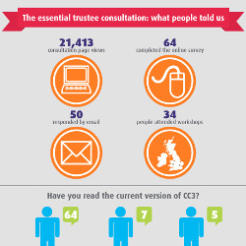All charities must follow recommended good practice or explain why, the Charity Commission has said as part of the launch of its new "clearer and more concise" guidance for all trustees.
An updated version of The Essential Trustee, intended to be the first piece of guidance a trustee reads, is now available from the Charity Commission’s website.
The regulator hopes the guidance makes it clearer what is expected of trustees by using simpler language and providing the document in a web-friendly format, with links to further guidance on specific topics, and a shorter summary document.
Unveiling the new guidance yesterday at the Commission’s public meeting in Birmingham, Neal Green, senior policy adviser at the Commission, said the regulator had listened to concerns from within the sector about whether charities “must” or “should” follow bits of the guidance.
He said that where the word “must” is used charities have to something to comply with the law, but that: “We expect trustees to apply good practice.” If they don’t they “should be able to explain their approach”.
“In some cases if you don’t comply with good practice you could end up breaking the law,” he said because areas such as having adequate financial controls were “on the cusp” of where charities could end up in breach of their legal duties if they don’t follow good practice.
Green also appealed the sector’s umbrella bodies to encourage their members to read the new guidance, saying that seven people who responded to the consultation had never read the previous version.
Karl Wilding, director of public policy for NCVO, said: “This document should be one of the very first things all trustees read. The new guidance is clearer and more concise than its predecessor, with a structure that’s easier to follow. These improvements and the added clarity are a result of the Charity Commission’s thoughtful consultation process, taking on board feedback and addressing our concerns.”
Simpler language
Green said that the new version of the guidance used simpler language to help trustees understand their duties.
One example is replacing the phrase “duty of prudence” with a “duty to manage your charity’s resources responsibly,” he said.
William Shawcross, chief executive of the Charity Commission, said: “We want trustees to feel confident in knowing what their duties are and empowered to carry them out. I hope this new clearer guidance will help them do just that. I encourage all trustees to read it, all prospective trustees to read it and for the charity sector itself to join us in promoting this as far and as wide as possible, because it is in all our interests that trustees understand their roles better.”
He also said that current criticism of fundraising practices is a “very important issue for the sector and could be very damaging” and that although the Commission does not regulate fundraising it is involved in discussions because of it is “concerned with the reputation of the charitable sector”.
‘Grantmakers have to ensure funds are spent appropriately’
Nick Donaldson, outreach manager at the Commission, warned funders that they had to make sure grants were used appropriately.
“Grantmakers making a charitable gift need to ensure that they are checking that the organisation is a suitable organisation to be partnered with and ensuring that the work the grant is provided for is carried out,” he said.
Video of public meetings to be made available online
The Commission is working towards filming its public meetings and to make the discussions available on its website to reach a wider audience.
Public meetings are held around the country a few times a year and a number of experts from the Commission gives presentation on issues affecting the sector and updates on its guidance.
Jack Rowley, public affairs manager, told Civil Society News that he hoped to start making content available online by the end of this year.









